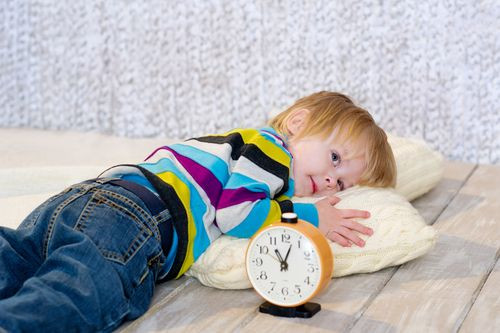Toddlers’ Bedtime Contributes To Sleep Difficulties: How Melatonin Determines Best Time To Fall Asleep

Parents may experience bedtime battles with their toddlers often hearing the words, "I'm not tired, Mommy,” as kids are unwilling to fall asleep. While these bedtime tantrums could lead to toddlers getting out of bed and crawling into their parents’ room, it could be an indication that they’re not biologically ready for sleep. According to a recent study, a toddlers’ good night’s sleep is contingent on the body’s levels of melatonin, which govern the biological clock that prepares them to sleep at different times in the evening.
Nighttime settling difficulties, such as bedtime resistance and sleep-onset delay, typically occur in about 25 percent of young children, says the American Sleep Apnea Association. This alarmingly high statistic is not surprising since unlike adults, toddlers rarely have the option of choosing their bedtime. If kids are fighting their bedtime, it may be that they are not biologically ready at the parent-designated time chosen for them. Sleeping difficulties in toddlers are often associated with attentional, behavioral, and emotional problems later in life.
The timing of toddlers’ melatonin release could determine when a child’s body clock is ready for bed. Melatonin, a hormone that governs the internal body clock, is often secreted at night or in the dark, which can regulate the sleeping cycle. The National Sleep Foundation says as melatonin levels in the blood begin to rise sharply in the evening, toddlers will begin to feel less alert and are more vulnerable to fall asleep faster and longer.
Published in the journal Mind, Brain and Education, a team of researchers from the University of Colorado, Boulder, examined whether the timing of internal circadian melatonin phase, such as dim light melatonin onset, and its association with parents-selected bedtimes were related to nighttime behaviors in a small cohort of toddlers. The bedtime habits of 14 regularly napping preschoolers, eight females and six males, between 30 and 36 months, were observed by the researchers in the study.
The researchers measured parent-report of nighttime settling, actigraphic assessment of sleep onset latency, evening salivary of dim light melatonin onset throughout six days. Prior to the study, the toddlers slept for an average of 10.5 hours nightly and took a daytime nap of at least 45 minutes. The children’s saliva samples containing their melatonin levels were collected every 30 minutes over a six-hour period on one evening before bedtime, according to the news release. The researchers distributed special wristwatches to accurately measure activity as an objective means to assess the toddlers’ sleep.
The findings revealed melatonin onset times varied among the toddlers, which indicated the body clocks induced sleep in children at different times in the evening. The average evening melatonin onset for the toddlers occurred roughly at 7:40 p.m., which happened about 30 minutes before parent-selected bedtimes. The majority of the toddlers typically fell asleep about 30 minutes after bedtime.
However, toddlers who were put to bed before their rise in melatonin levels, took 40 to 60 minutes to fall asleep. In these cases, toddlers lay in bed awake for a long period of time, and could possibly lead them to associate bed with arousal, rather than sleep. This could lead to a lifelong risk for insomnia over a period of time in children, the researchers believe.
“It’s not practical to assess melatonin levels in every child,” Assistant Professor Monique LeBourgeois, lead author of the study from CU-Boulder, said in the news release. “But if your child is resisting bedtime or having problems falling asleep, it is likely he or she is not physiologically ready for sleep at that time.” Therefore, the more tired toddlers are when they go to bed, the more likely they are to fall asleep.
This study is one of few who delved into how the physiology of toddlers may contribute to the incidence of sleep problems. The findings highlight the importance of establishing bedtimes that are in sync with toddlers’ biological clocks to prevent negative physical and mental health outcomes, and lead to poor cognitive function that can follow later into childhood and adolescence.
“A natural next step is to optimize our knowledge of the interactions between physiology and the environment to further understand how problems like bedtime resistance first develop and how they are maintained,” LeBourgeois said.
The researchers emphasize children who miss out on needed sleep do not benefit from positive life experiences and often express difficulty in dealing with day-to-day challenges. Sleep is considered to be the primary brain activity for infants and therefore, chronic lack of sleep can affect a young child’s development.
For tips on how you can help your child can adopt good bedtime habits, click here.
Source: Jenni OG, LeBourgeois HB, LeBourgeois MK et al. Dissonance Between Parent-Selected Bedtimes and Young Children's Circadian Physiology Influences Nighttime Settling Difficulties. Mind, Brain, and Education. 2013.



























